BDTX3103 Introductory Taxation - Review of Malaysian Tax System
VerifiedAdded on 2023/06/11
|10
|3092
|135
Report
AI Summary
This report provides a comprehensive overview of the Malaysian tax system, focusing on its administration and recent changes. It begins by describing the roles and functions of the Inland Revenue Board of Malaysia (IRBM) as the primary tax administrator. The report then outlines the structure of the Malaysian tax system, differentiating between direct and indirect taxes, including income tax, real property gain tax, stamp duty, petroleum tax, import/export duties, GST, excise duty, and service tax. A significant portion of the report is dedicated to discussing specific changes in the Malaysian income tax system, such as income tax relief for resident taxpayers, exemptions granted by the government for women returning to work and interest income, tax exemptions on rental income, and increases in retention sums. The report also reviews the implications of these changes on taxpayers in Malaysia, highlighting the potential benefits of reduced tax rates, incentives for reasonable rental pricing, encouragement of savings in national education schemes, and the impact of penalty provisions on ensuring accurate tax reporting. The document concludes by emphasizing the overall positive effects of these changes on economic growth and community development.
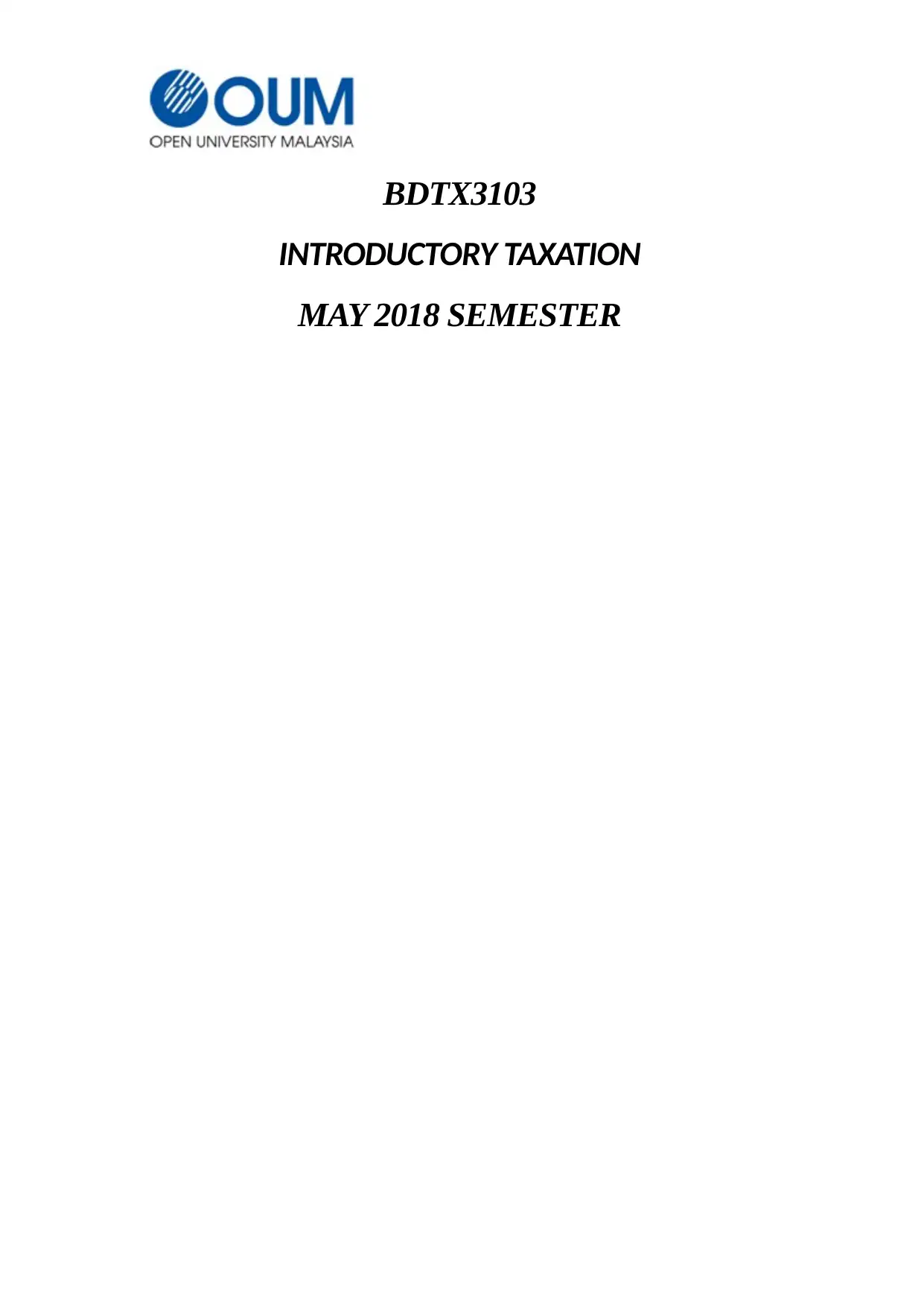
BDTX3103
INTRODUCTORY TAXATION
MAY 2018 SEMESTER
INTRODUCTORY TAXATION
MAY 2018 SEMESTER
Paraphrase This Document
Need a fresh take? Get an instant paraphrase of this document with our AI Paraphraser
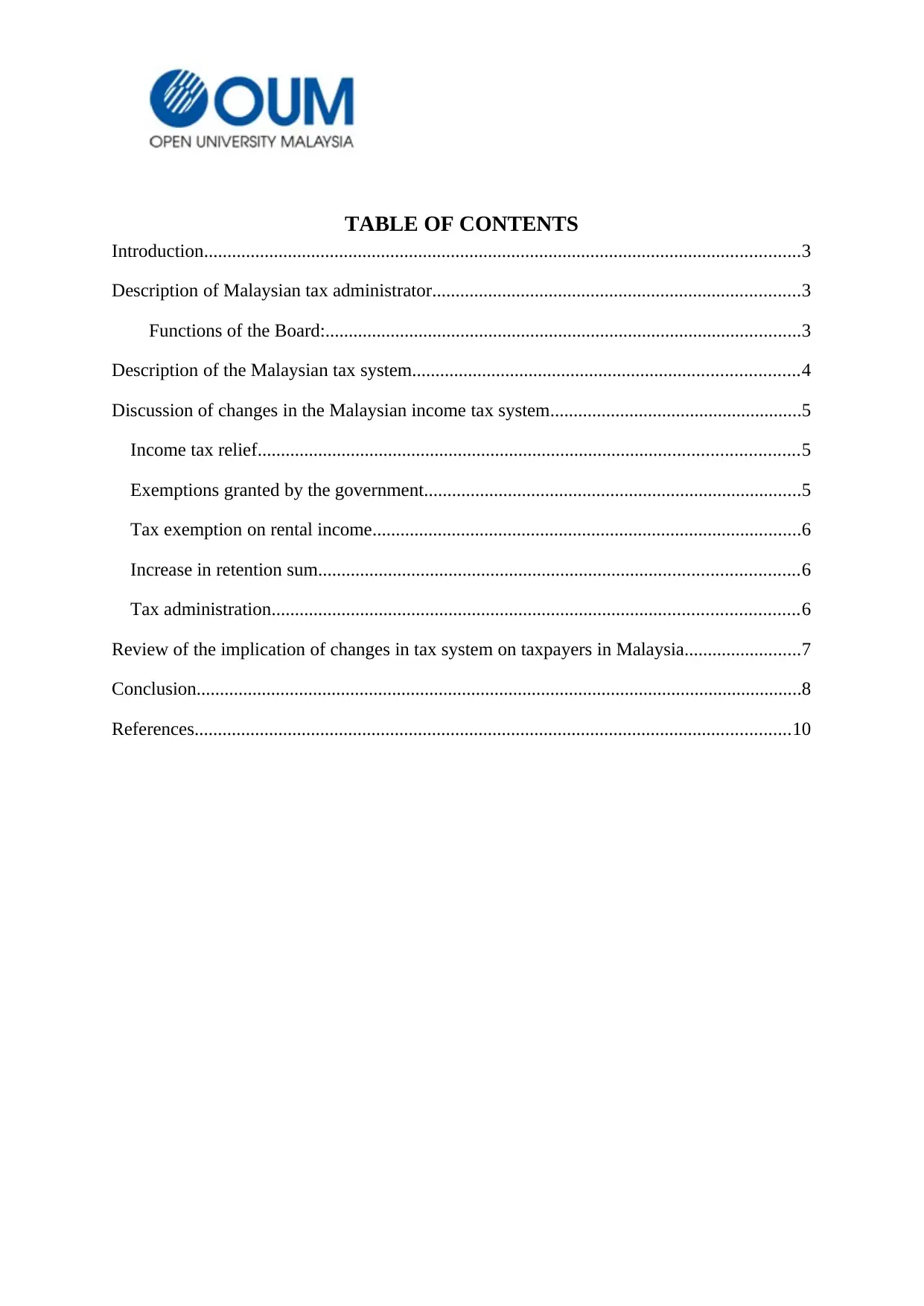
TABLE OF CONTENTS
Introduction................................................................................................................................3
Description of Malaysian tax administrator...............................................................................3
Functions of the Board:......................................................................................................3
Description of the Malaysian tax system...................................................................................4
Discussion of changes in the Malaysian income tax system......................................................5
Income tax relief....................................................................................................................5
Exemptions granted by the government.................................................................................5
Tax exemption on rental income............................................................................................6
Increase in retention sum.......................................................................................................6
Tax administration.................................................................................................................6
Review of the implication of changes in tax system on taxpayers in Malaysia.........................7
Conclusion..................................................................................................................................8
References................................................................................................................................10
Introduction................................................................................................................................3
Description of Malaysian tax administrator...............................................................................3
Functions of the Board:......................................................................................................3
Description of the Malaysian tax system...................................................................................4
Discussion of changes in the Malaysian income tax system......................................................5
Income tax relief....................................................................................................................5
Exemptions granted by the government.................................................................................5
Tax exemption on rental income............................................................................................6
Increase in retention sum.......................................................................................................6
Tax administration.................................................................................................................6
Review of the implication of changes in tax system on taxpayers in Malaysia.........................7
Conclusion..................................................................................................................................8
References................................................................................................................................10
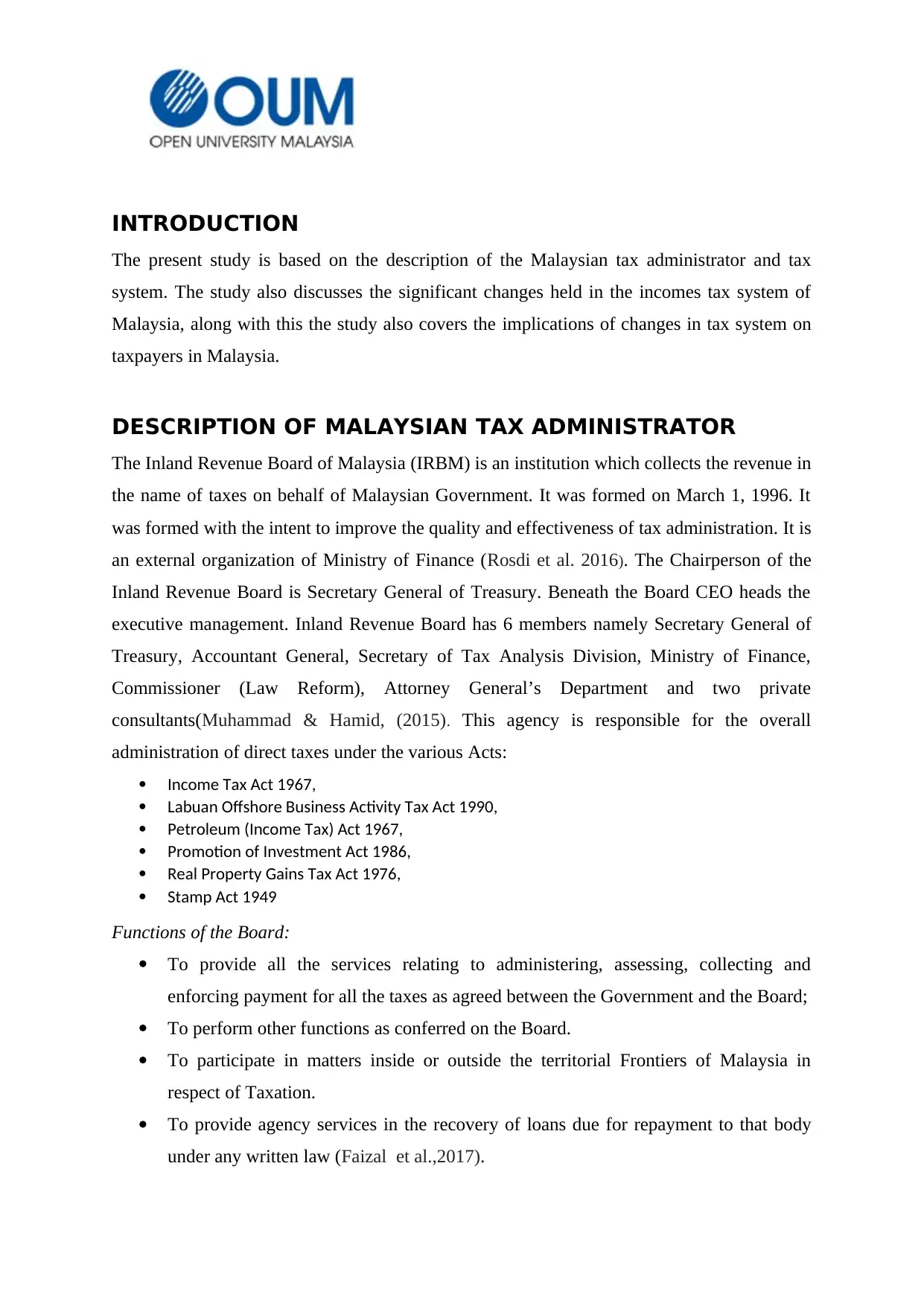
INTRODUCTION
The present study is based on the description of the Malaysian tax administrator and tax
system. The study also discusses the significant changes held in the incomes tax system of
Malaysia, along with this the study also covers the implications of changes in tax system on
taxpayers in Malaysia.
DESCRIPTION OF MALAYSIAN TAX ADMINISTRATOR
The Inland Revenue Board of Malaysia (IRBM) is an institution which collects the revenue in
the name of taxes on behalf of Malaysian Government. It was formed on March 1, 1996. It
was formed with the intent to improve the quality and effectiveness of tax administration. It is
an external organization of Ministry of Finance (Rosdi et al. 2016). The Chairperson of the
Inland Revenue Board is Secretary General of Treasury. Beneath the Board CEO heads the
executive management. Inland Revenue Board has 6 members namely Secretary General of
Treasury, Accountant General, Secretary of Tax Analysis Division, Ministry of Finance,
Commissioner (Law Reform), Attorney General’s Department and two private
consultants(Muhammad & Hamid, (2015). This agency is responsible for the overall
administration of direct taxes under the various Acts:
Income Tax Act 1967,
Labuan Offshore Business Activity Tax Act 1990,
Petroleum (Income Tax) Act 1967,
Promotion of Investment Act 1986,
Real Property Gains Tax Act 1976,
Stamp Act 1949
Functions of the Board:
To provide all the services relating to administering, assessing, collecting and
enforcing payment for all the taxes as agreed between the Government and the Board;
To perform other functions as conferred on the Board.
To participate in matters inside or outside the territorial Frontiers of Malaysia in
respect of Taxation.
To provide agency services in the recovery of loans due for repayment to that body
under any written law (Faizal et al.,2017).
The present study is based on the description of the Malaysian tax administrator and tax
system. The study also discusses the significant changes held in the incomes tax system of
Malaysia, along with this the study also covers the implications of changes in tax system on
taxpayers in Malaysia.
DESCRIPTION OF MALAYSIAN TAX ADMINISTRATOR
The Inland Revenue Board of Malaysia (IRBM) is an institution which collects the revenue in
the name of taxes on behalf of Malaysian Government. It was formed on March 1, 1996. It
was formed with the intent to improve the quality and effectiveness of tax administration. It is
an external organization of Ministry of Finance (Rosdi et al. 2016). The Chairperson of the
Inland Revenue Board is Secretary General of Treasury. Beneath the Board CEO heads the
executive management. Inland Revenue Board has 6 members namely Secretary General of
Treasury, Accountant General, Secretary of Tax Analysis Division, Ministry of Finance,
Commissioner (Law Reform), Attorney General’s Department and two private
consultants(Muhammad & Hamid, (2015). This agency is responsible for the overall
administration of direct taxes under the various Acts:
Income Tax Act 1967,
Labuan Offshore Business Activity Tax Act 1990,
Petroleum (Income Tax) Act 1967,
Promotion of Investment Act 1986,
Real Property Gains Tax Act 1976,
Stamp Act 1949
Functions of the Board:
To provide all the services relating to administering, assessing, collecting and
enforcing payment for all the taxes as agreed between the Government and the Board;
To perform other functions as conferred on the Board.
To participate in matters inside or outside the territorial Frontiers of Malaysia in
respect of Taxation.
To provide agency services in the recovery of loans due for repayment to that body
under any written law (Faizal et al.,2017).
⊘ This is a preview!⊘
Do you want full access?
Subscribe today to unlock all pages.

Trusted by 1+ million students worldwide
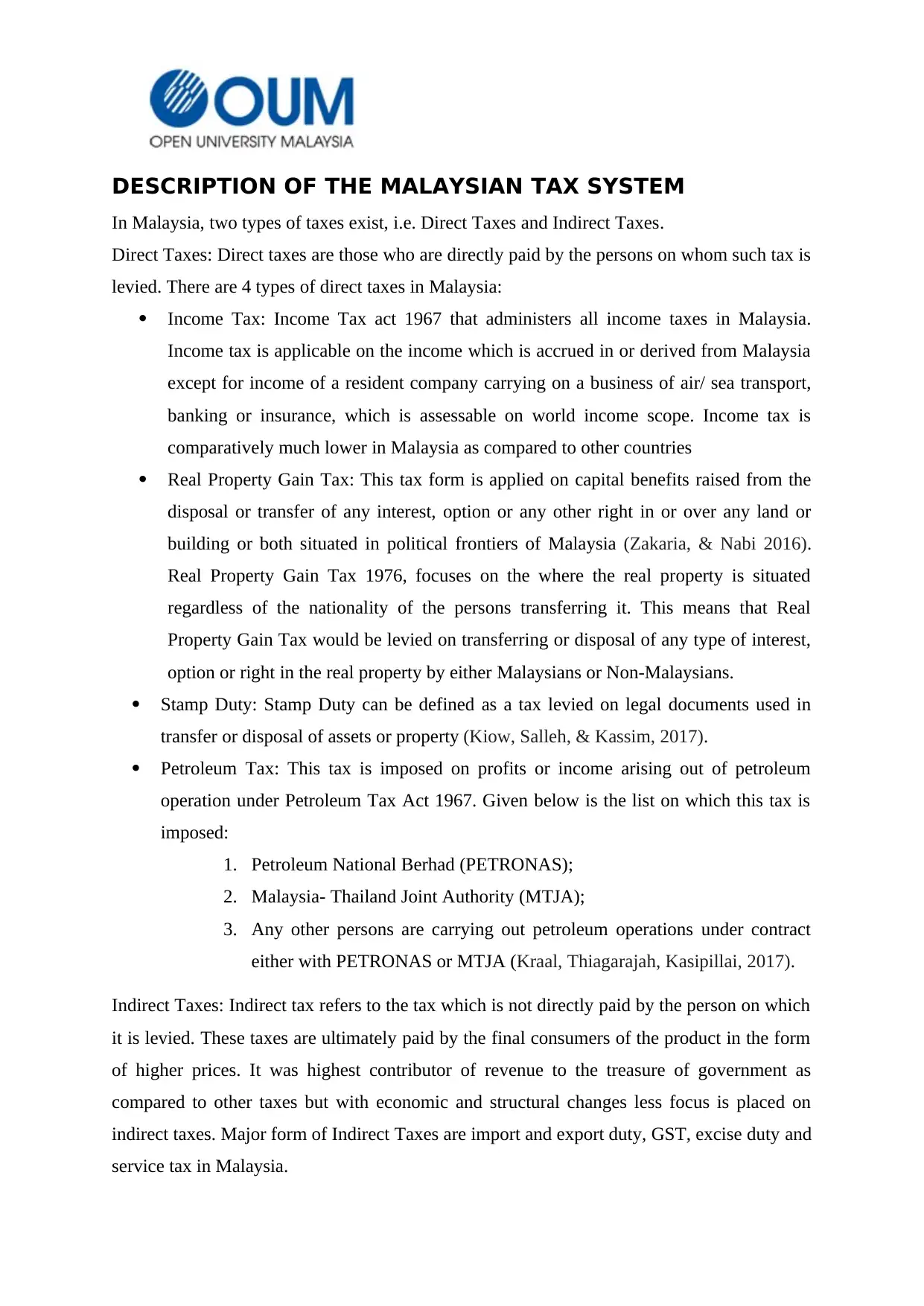
DESCRIPTION OF THE MALAYSIAN TAX SYSTEM
In Malaysia, two types of taxes exist, i.e. Direct Taxes and Indirect Taxes.
Direct Taxes: Direct taxes are those who are directly paid by the persons on whom such tax is
levied. There are 4 types of direct taxes in Malaysia:
Income Tax: Income Tax act 1967 that administers all income taxes in Malaysia.
Income tax is applicable on the income which is accrued in or derived from Malaysia
except for income of a resident company carrying on a business of air/ sea transport,
banking or insurance, which is assessable on world income scope. Income tax is
comparatively much lower in Malaysia as compared to other countries
Real Property Gain Tax: This tax form is applied on capital benefits raised from the
disposal or transfer of any interest, option or any other right in or over any land or
building or both situated in political frontiers of Malaysia (Zakaria, & Nabi 2016).
Real Property Gain Tax 1976, focuses on the where the real property is situated
regardless of the nationality of the persons transferring it. This means that Real
Property Gain Tax would be levied on transferring or disposal of any type of interest,
option or right in the real property by either Malaysians or Non-Malaysians.
Stamp Duty: Stamp Duty can be defined as a tax levied on legal documents used in
transfer or disposal of assets or property (Kiow, Salleh, & Kassim, 2017).
Petroleum Tax: This tax is imposed on profits or income arising out of petroleum
operation under Petroleum Tax Act 1967. Given below is the list on which this tax is
imposed:
1. Petroleum National Berhad (PETRONAS);
2. Malaysia- Thailand Joint Authority (MTJA);
3. Any other persons are carrying out petroleum operations under contract
either with PETRONAS or MTJA (Kraal, Thiagarajah, Kasipillai, 2017).
Indirect Taxes: Indirect tax refers to the tax which is not directly paid by the person on which
it is levied. These taxes are ultimately paid by the final consumers of the product in the form
of higher prices. It was highest contributor of revenue to the treasure of government as
compared to other taxes but with economic and structural changes less focus is placed on
indirect taxes. Major form of Indirect Taxes are import and export duty, GST, excise duty and
service tax in Malaysia.
In Malaysia, two types of taxes exist, i.e. Direct Taxes and Indirect Taxes.
Direct Taxes: Direct taxes are those who are directly paid by the persons on whom such tax is
levied. There are 4 types of direct taxes in Malaysia:
Income Tax: Income Tax act 1967 that administers all income taxes in Malaysia.
Income tax is applicable on the income which is accrued in or derived from Malaysia
except for income of a resident company carrying on a business of air/ sea transport,
banking or insurance, which is assessable on world income scope. Income tax is
comparatively much lower in Malaysia as compared to other countries
Real Property Gain Tax: This tax form is applied on capital benefits raised from the
disposal or transfer of any interest, option or any other right in or over any land or
building or both situated in political frontiers of Malaysia (Zakaria, & Nabi 2016).
Real Property Gain Tax 1976, focuses on the where the real property is situated
regardless of the nationality of the persons transferring it. This means that Real
Property Gain Tax would be levied on transferring or disposal of any type of interest,
option or right in the real property by either Malaysians or Non-Malaysians.
Stamp Duty: Stamp Duty can be defined as a tax levied on legal documents used in
transfer or disposal of assets or property (Kiow, Salleh, & Kassim, 2017).
Petroleum Tax: This tax is imposed on profits or income arising out of petroleum
operation under Petroleum Tax Act 1967. Given below is the list on which this tax is
imposed:
1. Petroleum National Berhad (PETRONAS);
2. Malaysia- Thailand Joint Authority (MTJA);
3. Any other persons are carrying out petroleum operations under contract
either with PETRONAS or MTJA (Kraal, Thiagarajah, Kasipillai, 2017).
Indirect Taxes: Indirect tax refers to the tax which is not directly paid by the person on which
it is levied. These taxes are ultimately paid by the final consumers of the product in the form
of higher prices. It was highest contributor of revenue to the treasure of government as
compared to other taxes but with economic and structural changes less focus is placed on
indirect taxes. Major form of Indirect Taxes are import and export duty, GST, excise duty and
service tax in Malaysia.
Paraphrase This Document
Need a fresh take? Get an instant paraphrase of this document with our AI Paraphraser
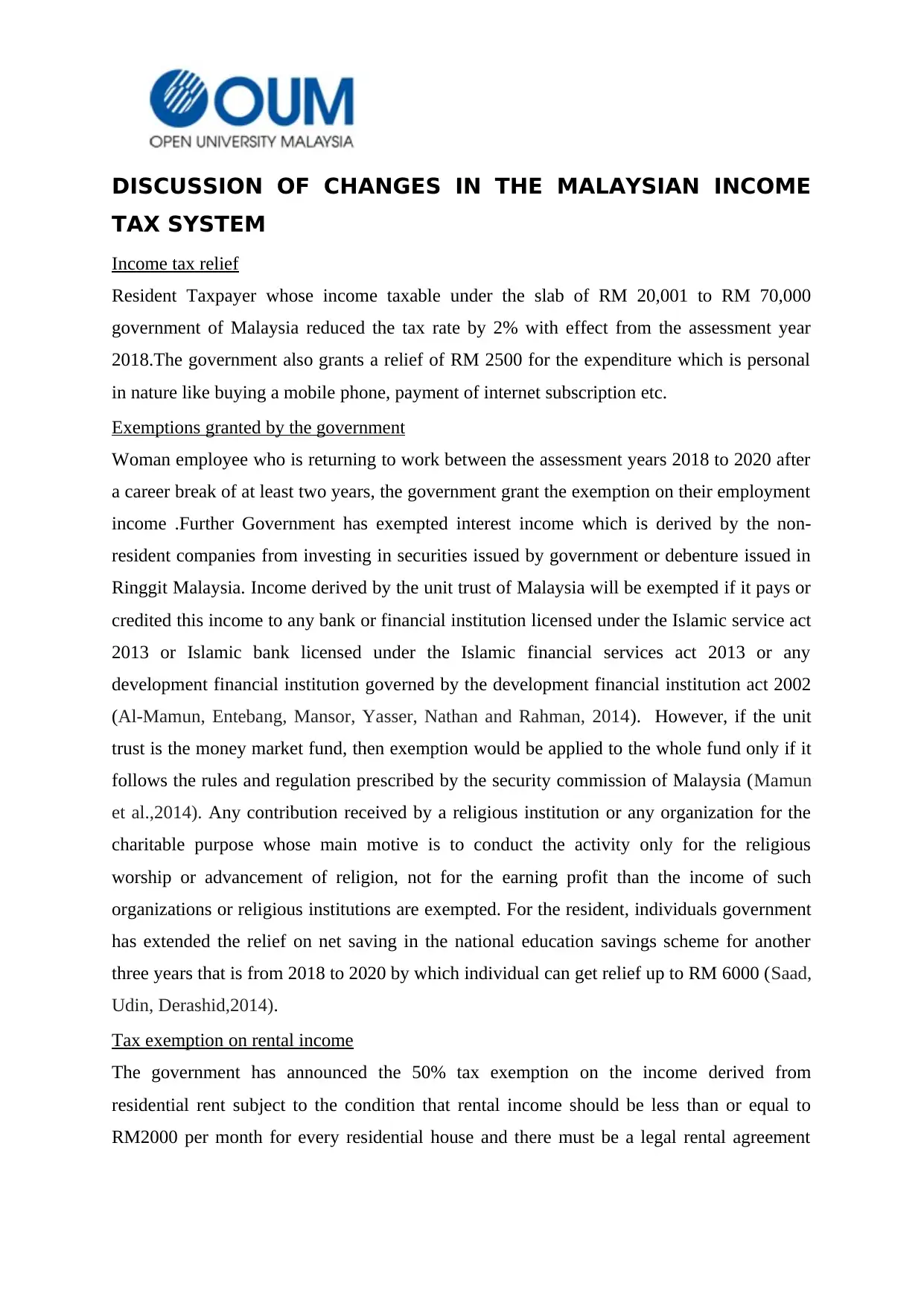
DISCUSSION OF CHANGES IN THE MALAYSIAN INCOME
TAX SYSTEM
Income tax relief
Resident Taxpayer whose income taxable under the slab of RM 20,001 to RM 70,000
government of Malaysia reduced the tax rate by 2% with effect from the assessment year
2018.The government also grants a relief of RM 2500 for the expenditure which is personal
in nature like buying a mobile phone, payment of internet subscription etc.
Exemptions granted by the government
Woman employee who is returning to work between the assessment years 2018 to 2020 after
a career break of at least two years, the government grant the exemption on their employment
income .Further Government has exempted interest income which is derived by the non-
resident companies from investing in securities issued by government or debenture issued in
Ringgit Malaysia. Income derived by the unit trust of Malaysia will be exempted if it pays or
credited this income to any bank or financial institution licensed under the Islamic service act
2013 or Islamic bank licensed under the Islamic financial services act 2013 or any
development financial institution governed by the development financial institution act 2002
(Al-Mamun, Entebang, Mansor, Yasser, Nathan and Rahman, 2014). However, if the unit
trust is the money market fund, then exemption would be applied to the whole fund only if it
follows the rules and regulation prescribed by the security commission of Malaysia (Mamun
et al.,2014). Any contribution received by a religious institution or any organization for the
charitable purpose whose main motive is to conduct the activity only for the religious
worship or advancement of religion, not for the earning profit than the income of such
organizations or religious institutions are exempted. For the resident, individuals government
has extended the relief on net saving in the national education savings scheme for another
three years that is from 2018 to 2020 by which individual can get relief up to RM 6000 (Saad,
Udin, Derashid,2014).
Tax exemption on rental income
The government has announced the 50% tax exemption on the income derived from
residential rent subject to the condition that rental income should be less than or equal to
RM2000 per month for every residential house and there must be a legal rental agreement
TAX SYSTEM
Income tax relief
Resident Taxpayer whose income taxable under the slab of RM 20,001 to RM 70,000
government of Malaysia reduced the tax rate by 2% with effect from the assessment year
2018.The government also grants a relief of RM 2500 for the expenditure which is personal
in nature like buying a mobile phone, payment of internet subscription etc.
Exemptions granted by the government
Woman employee who is returning to work between the assessment years 2018 to 2020 after
a career break of at least two years, the government grant the exemption on their employment
income .Further Government has exempted interest income which is derived by the non-
resident companies from investing in securities issued by government or debenture issued in
Ringgit Malaysia. Income derived by the unit trust of Malaysia will be exempted if it pays or
credited this income to any bank or financial institution licensed under the Islamic service act
2013 or Islamic bank licensed under the Islamic financial services act 2013 or any
development financial institution governed by the development financial institution act 2002
(Al-Mamun, Entebang, Mansor, Yasser, Nathan and Rahman, 2014). However, if the unit
trust is the money market fund, then exemption would be applied to the whole fund only if it
follows the rules and regulation prescribed by the security commission of Malaysia (Mamun
et al.,2014). Any contribution received by a religious institution or any organization for the
charitable purpose whose main motive is to conduct the activity only for the religious
worship or advancement of religion, not for the earning profit than the income of such
organizations or religious institutions are exempted. For the resident, individuals government
has extended the relief on net saving in the national education savings scheme for another
three years that is from 2018 to 2020 by which individual can get relief up to RM 6000 (Saad,
Udin, Derashid,2014).
Tax exemption on rental income
The government has announced the 50% tax exemption on the income derived from
residential rent subject to the condition that rental income should be less than or equal to
RM2000 per month for every residential house and there must be a legal rental agreement
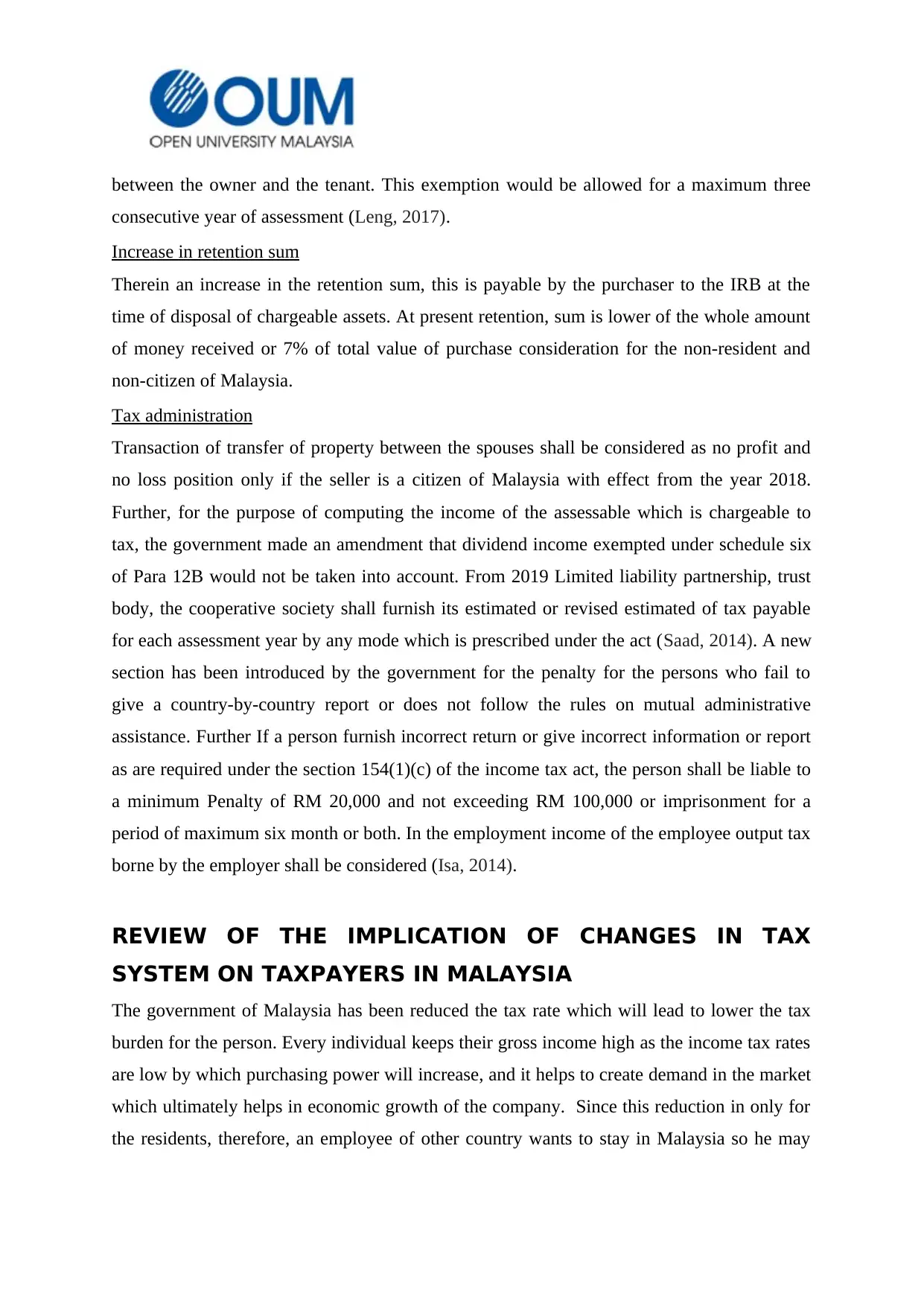
between the owner and the tenant. This exemption would be allowed for a maximum three
consecutive year of assessment (Leng, 2017).
Increase in retention sum
Therein an increase in the retention sum, this is payable by the purchaser to the IRB at the
time of disposal of chargeable assets. At present retention, sum is lower of the whole amount
of money received or 7% of total value of purchase consideration for the non-resident and
non-citizen of Malaysia.
Tax administration
Transaction of transfer of property between the spouses shall be considered as no profit and
no loss position only if the seller is a citizen of Malaysia with effect from the year 2018.
Further, for the purpose of computing the income of the assessable which is chargeable to
tax, the government made an amendment that dividend income exempted under schedule six
of Para 12B would not be taken into account. From 2019 Limited liability partnership, trust
body, the cooperative society shall furnish its estimated or revised estimated of tax payable
for each assessment year by any mode which is prescribed under the act (Saad, 2014). A new
section has been introduced by the government for the penalty for the persons who fail to
give a country-by-country report or does not follow the rules on mutual administrative
assistance. Further If a person furnish incorrect return or give incorrect information or report
as are required under the section 154(1)(c) of the income tax act, the person shall be liable to
a minimum Penalty of RM 20,000 and not exceeding RM 100,000 or imprisonment for a
period of maximum six month or both. In the employment income of the employee output tax
borne by the employer shall be considered (Isa, 2014).
REVIEW OF THE IMPLICATION OF CHANGES IN TAX
SYSTEM ON TAXPAYERS IN MALAYSIA
The government of Malaysia has been reduced the tax rate which will lead to lower the tax
burden for the person. Every individual keeps their gross income high as the income tax rates
are low by which purchasing power will increase, and it helps to create demand in the market
which ultimately helps in economic growth of the company. Since this reduction in only for
the residents, therefore, an employee of other country wants to stay in Malaysia so he may
consecutive year of assessment (Leng, 2017).
Increase in retention sum
Therein an increase in the retention sum, this is payable by the purchaser to the IRB at the
time of disposal of chargeable assets. At present retention, sum is lower of the whole amount
of money received or 7% of total value of purchase consideration for the non-resident and
non-citizen of Malaysia.
Tax administration
Transaction of transfer of property between the spouses shall be considered as no profit and
no loss position only if the seller is a citizen of Malaysia with effect from the year 2018.
Further, for the purpose of computing the income of the assessable which is chargeable to
tax, the government made an amendment that dividend income exempted under schedule six
of Para 12B would not be taken into account. From 2019 Limited liability partnership, trust
body, the cooperative society shall furnish its estimated or revised estimated of tax payable
for each assessment year by any mode which is prescribed under the act (Saad, 2014). A new
section has been introduced by the government for the penalty for the persons who fail to
give a country-by-country report or does not follow the rules on mutual administrative
assistance. Further If a person furnish incorrect return or give incorrect information or report
as are required under the section 154(1)(c) of the income tax act, the person shall be liable to
a minimum Penalty of RM 20,000 and not exceeding RM 100,000 or imprisonment for a
period of maximum six month or both. In the employment income of the employee output tax
borne by the employer shall be considered (Isa, 2014).
REVIEW OF THE IMPLICATION OF CHANGES IN TAX
SYSTEM ON TAXPAYERS IN MALAYSIA
The government of Malaysia has been reduced the tax rate which will lead to lower the tax
burden for the person. Every individual keeps their gross income high as the income tax rates
are low by which purchasing power will increase, and it helps to create demand in the market
which ultimately helps in economic growth of the company. Since this reduction in only for
the residents, therefore, an employee of other country wants to stay in Malaysia so he may
⊘ This is a preview!⊘
Do you want full access?
Subscribe today to unlock all pages.

Trusted by 1+ million students worldwide
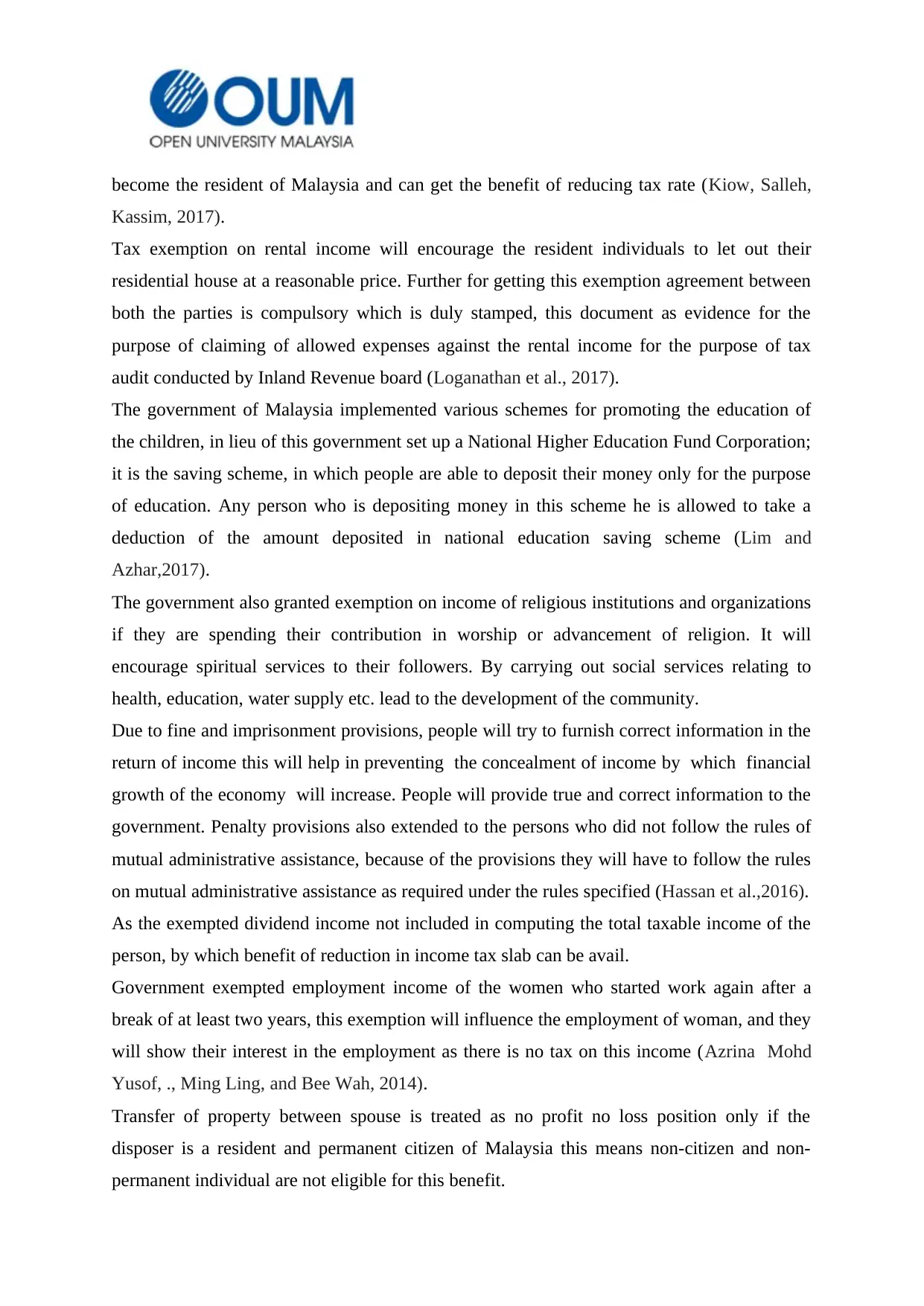
become the resident of Malaysia and can get the benefit of reducing tax rate (Kiow, Salleh,
Kassim, 2017).
Tax exemption on rental income will encourage the resident individuals to let out their
residential house at a reasonable price. Further for getting this exemption agreement between
both the parties is compulsory which is duly stamped, this document as evidence for the
purpose of claiming of allowed expenses against the rental income for the purpose of tax
audit conducted by Inland Revenue board (Loganathan et al., 2017).
The government of Malaysia implemented various schemes for promoting the education of
the children, in lieu of this government set up a National Higher Education Fund Corporation;
it is the saving scheme, in which people are able to deposit their money only for the purpose
of education. Any person who is depositing money in this scheme he is allowed to take a
deduction of the amount deposited in national education saving scheme (Lim and
Azhar,2017).
The government also granted exemption on income of religious institutions and organizations
if they are spending their contribution in worship or advancement of religion. It will
encourage spiritual services to their followers. By carrying out social services relating to
health, education, water supply etc. lead to the development of the community.
Due to fine and imprisonment provisions, people will try to furnish correct information in the
return of income this will help in preventing the concealment of income by which financial
growth of the economy will increase. People will provide true and correct information to the
government. Penalty provisions also extended to the persons who did not follow the rules of
mutual administrative assistance, because of the provisions they will have to follow the rules
on mutual administrative assistance as required under the rules specified (Hassan et al.,2016).
As the exempted dividend income not included in computing the total taxable income of the
person, by which benefit of reduction in income tax slab can be avail.
Government exempted employment income of the women who started work again after a
break of at least two years, this exemption will influence the employment of woman, and they
will show their interest in the employment as there is no tax on this income (Azrina Mohd
Yusof, ., Ming Ling, and Bee Wah, 2014).
Transfer of property between spouse is treated as no profit no loss position only if the
disposer is a resident and permanent citizen of Malaysia this means non-citizen and non-
permanent individual are not eligible for this benefit.
Kassim, 2017).
Tax exemption on rental income will encourage the resident individuals to let out their
residential house at a reasonable price. Further for getting this exemption agreement between
both the parties is compulsory which is duly stamped, this document as evidence for the
purpose of claiming of allowed expenses against the rental income for the purpose of tax
audit conducted by Inland Revenue board (Loganathan et al., 2017).
The government of Malaysia implemented various schemes for promoting the education of
the children, in lieu of this government set up a National Higher Education Fund Corporation;
it is the saving scheme, in which people are able to deposit their money only for the purpose
of education. Any person who is depositing money in this scheme he is allowed to take a
deduction of the amount deposited in national education saving scheme (Lim and
Azhar,2017).
The government also granted exemption on income of religious institutions and organizations
if they are spending their contribution in worship or advancement of religion. It will
encourage spiritual services to their followers. By carrying out social services relating to
health, education, water supply etc. lead to the development of the community.
Due to fine and imprisonment provisions, people will try to furnish correct information in the
return of income this will help in preventing the concealment of income by which financial
growth of the economy will increase. People will provide true and correct information to the
government. Penalty provisions also extended to the persons who did not follow the rules of
mutual administrative assistance, because of the provisions they will have to follow the rules
on mutual administrative assistance as required under the rules specified (Hassan et al.,2016).
As the exempted dividend income not included in computing the total taxable income of the
person, by which benefit of reduction in income tax slab can be avail.
Government exempted employment income of the women who started work again after a
break of at least two years, this exemption will influence the employment of woman, and they
will show their interest in the employment as there is no tax on this income (Azrina Mohd
Yusof, ., Ming Ling, and Bee Wah, 2014).
Transfer of property between spouse is treated as no profit no loss position only if the
disposer is a resident and permanent citizen of Malaysia this means non-citizen and non-
permanent individual are not eligible for this benefit.
Paraphrase This Document
Need a fresh take? Get an instant paraphrase of this document with our AI Paraphraser
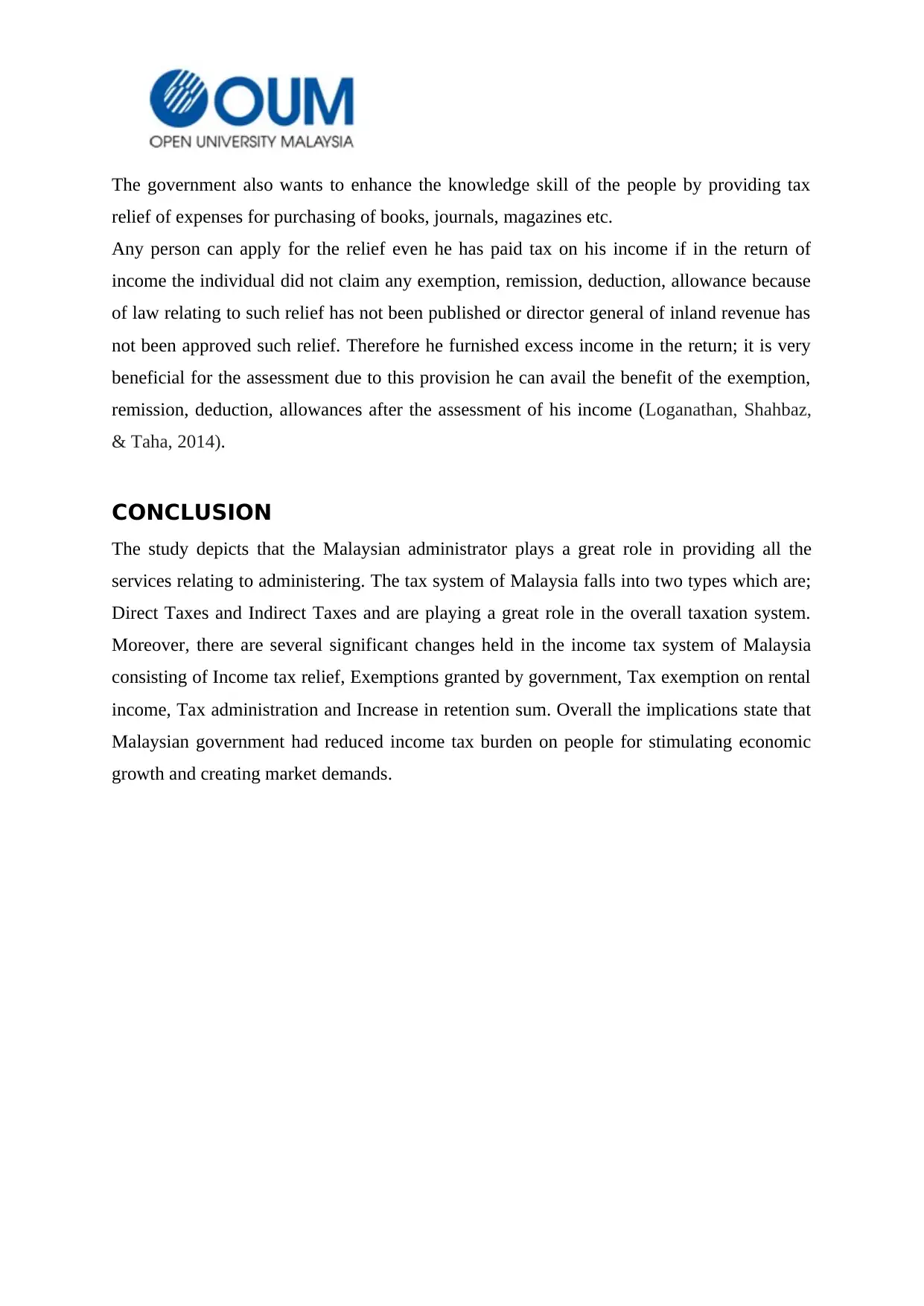
The government also wants to enhance the knowledge skill of the people by providing tax
relief of expenses for purchasing of books, journals, magazines etc.
Any person can apply for the relief even he has paid tax on his income if in the return of
income the individual did not claim any exemption, remission, deduction, allowance because
of law relating to such relief has not been published or director general of inland revenue has
not been approved such relief. Therefore he furnished excess income in the return; it is very
beneficial for the assessment due to this provision he can avail the benefit of the exemption,
remission, deduction, allowances after the assessment of his income (Loganathan, Shahbaz,
& Taha, 2014).
CONCLUSION
The study depicts that the Malaysian administrator plays a great role in providing all the
services relating to administering. The tax system of Malaysia falls into two types which are;
Direct Taxes and Indirect Taxes and are playing a great role in the overall taxation system.
Moreover, there are several significant changes held in the income tax system of Malaysia
consisting of Income tax relief, Exemptions granted by government, Tax exemption on rental
income, Tax administration and Increase in retention sum. Overall the implications state that
Malaysian government had reduced income tax burden on people for stimulating economic
growth and creating market demands.
relief of expenses for purchasing of books, journals, magazines etc.
Any person can apply for the relief even he has paid tax on his income if in the return of
income the individual did not claim any exemption, remission, deduction, allowance because
of law relating to such relief has not been published or director general of inland revenue has
not been approved such relief. Therefore he furnished excess income in the return; it is very
beneficial for the assessment due to this provision he can avail the benefit of the exemption,
remission, deduction, allowances after the assessment of his income (Loganathan, Shahbaz,
& Taha, 2014).
CONCLUSION
The study depicts that the Malaysian administrator plays a great role in providing all the
services relating to administering. The tax system of Malaysia falls into two types which are;
Direct Taxes and Indirect Taxes and are playing a great role in the overall taxation system.
Moreover, there are several significant changes held in the income tax system of Malaysia
consisting of Income tax relief, Exemptions granted by government, Tax exemption on rental
income, Tax administration and Increase in retention sum. Overall the implications state that
Malaysian government had reduced income tax burden on people for stimulating economic
growth and creating market demands.
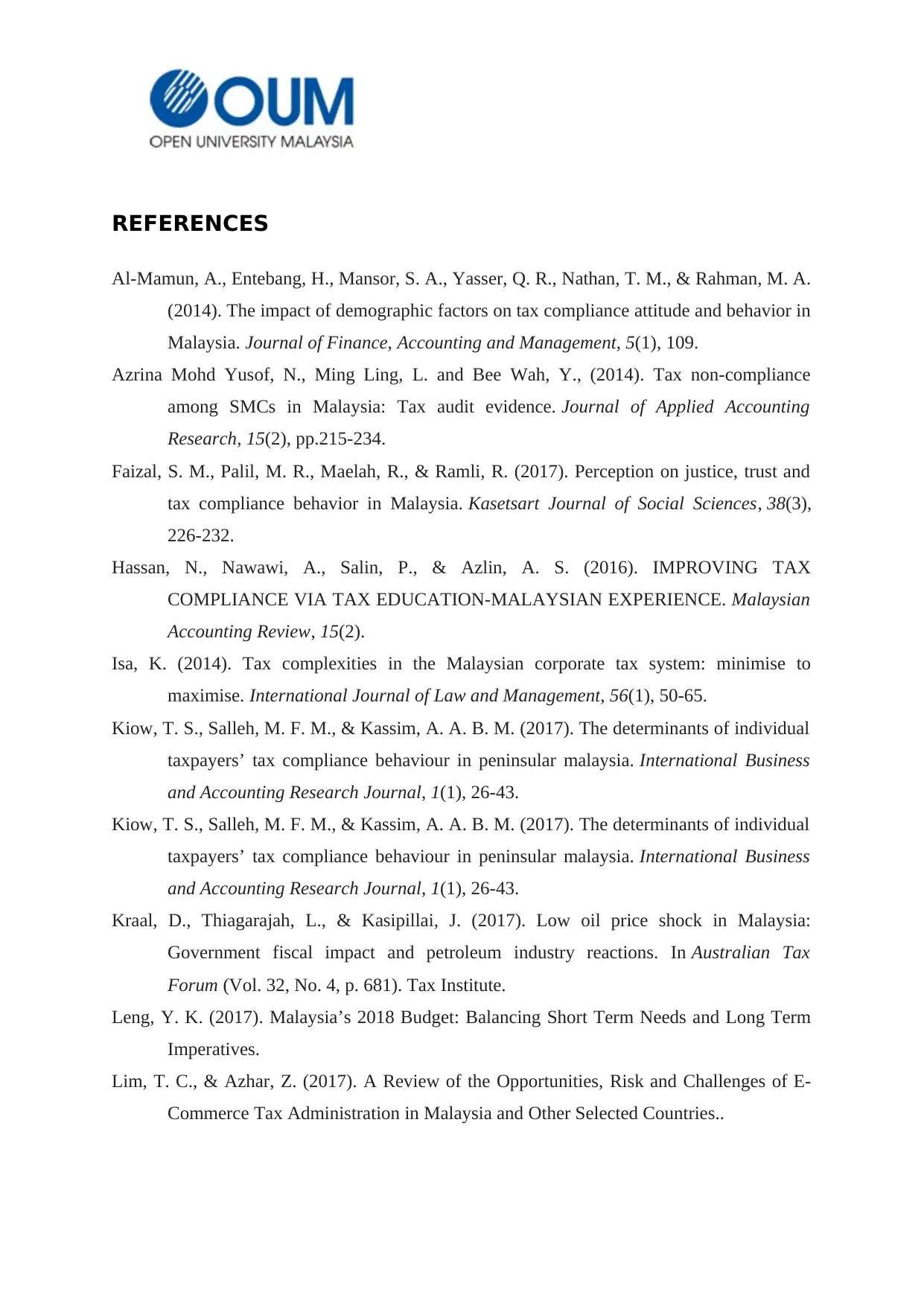
REFERENCES
Al-Mamun, A., Entebang, H., Mansor, S. A., Yasser, Q. R., Nathan, T. M., & Rahman, M. A.
(2014). The impact of demographic factors on tax compliance attitude and behavior in
Malaysia. Journal of Finance, Accounting and Management, 5(1), 109.
Azrina Mohd Yusof, N., Ming Ling, L. and Bee Wah, Y., (2014). Tax non-compliance
among SMCs in Malaysia: Tax audit evidence. Journal of Applied Accounting
Research, 15(2), pp.215-234.
Faizal, S. M., Palil, M. R., Maelah, R., & Ramli, R. (2017). Perception on justice, trust and
tax compliance behavior in Malaysia. Kasetsart Journal of Social Sciences, 38(3),
226-232.
Hassan, N., Nawawi, A., Salin, P., & Azlin, A. S. (2016). IMPROVING TAX
COMPLIANCE VIA TAX EDUCATION-MALAYSIAN EXPERIENCE. Malaysian
Accounting Review, 15(2).
Isa, K. (2014). Tax complexities in the Malaysian corporate tax system: minimise to
maximise. International Journal of Law and Management, 56(1), 50-65.
Kiow, T. S., Salleh, M. F. M., & Kassim, A. A. B. M. (2017). The determinants of individual
taxpayers’ tax compliance behaviour in peninsular malaysia. International Business
and Accounting Research Journal, 1(1), 26-43.
Kiow, T. S., Salleh, M. F. M., & Kassim, A. A. B. M. (2017). The determinants of individual
taxpayers’ tax compliance behaviour in peninsular malaysia. International Business
and Accounting Research Journal, 1(1), 26-43.
Kraal, D., Thiagarajah, L., & Kasipillai, J. (2017). Low oil price shock in Malaysia:
Government fiscal impact and petroleum industry reactions. In Australian Tax
Forum (Vol. 32, No. 4, p. 681). Tax Institute.
Leng, Y. K. (2017). Malaysia’s 2018 Budget: Balancing Short Term Needs and Long Term
Imperatives.
Lim, T. C., & Azhar, Z. (2017). A Review of the Opportunities, Risk and Challenges of E-
Commerce Tax Administration in Malaysia and Other Selected Countries..
Al-Mamun, A., Entebang, H., Mansor, S. A., Yasser, Q. R., Nathan, T. M., & Rahman, M. A.
(2014). The impact of demographic factors on tax compliance attitude and behavior in
Malaysia. Journal of Finance, Accounting and Management, 5(1), 109.
Azrina Mohd Yusof, N., Ming Ling, L. and Bee Wah, Y., (2014). Tax non-compliance
among SMCs in Malaysia: Tax audit evidence. Journal of Applied Accounting
Research, 15(2), pp.215-234.
Faizal, S. M., Palil, M. R., Maelah, R., & Ramli, R. (2017). Perception on justice, trust and
tax compliance behavior in Malaysia. Kasetsart Journal of Social Sciences, 38(3),
226-232.
Hassan, N., Nawawi, A., Salin, P., & Azlin, A. S. (2016). IMPROVING TAX
COMPLIANCE VIA TAX EDUCATION-MALAYSIAN EXPERIENCE. Malaysian
Accounting Review, 15(2).
Isa, K. (2014). Tax complexities in the Malaysian corporate tax system: minimise to
maximise. International Journal of Law and Management, 56(1), 50-65.
Kiow, T. S., Salleh, M. F. M., & Kassim, A. A. B. M. (2017). The determinants of individual
taxpayers’ tax compliance behaviour in peninsular malaysia. International Business
and Accounting Research Journal, 1(1), 26-43.
Kiow, T. S., Salleh, M. F. M., & Kassim, A. A. B. M. (2017). The determinants of individual
taxpayers’ tax compliance behaviour in peninsular malaysia. International Business
and Accounting Research Journal, 1(1), 26-43.
Kraal, D., Thiagarajah, L., & Kasipillai, J. (2017). Low oil price shock in Malaysia:
Government fiscal impact and petroleum industry reactions. In Australian Tax
Forum (Vol. 32, No. 4, p. 681). Tax Institute.
Leng, Y. K. (2017). Malaysia’s 2018 Budget: Balancing Short Term Needs and Long Term
Imperatives.
Lim, T. C., & Azhar, Z. (2017). A Review of the Opportunities, Risk and Challenges of E-
Commerce Tax Administration in Malaysia and Other Selected Countries..
⊘ This is a preview!⊘
Do you want full access?
Subscribe today to unlock all pages.

Trusted by 1+ million students worldwide
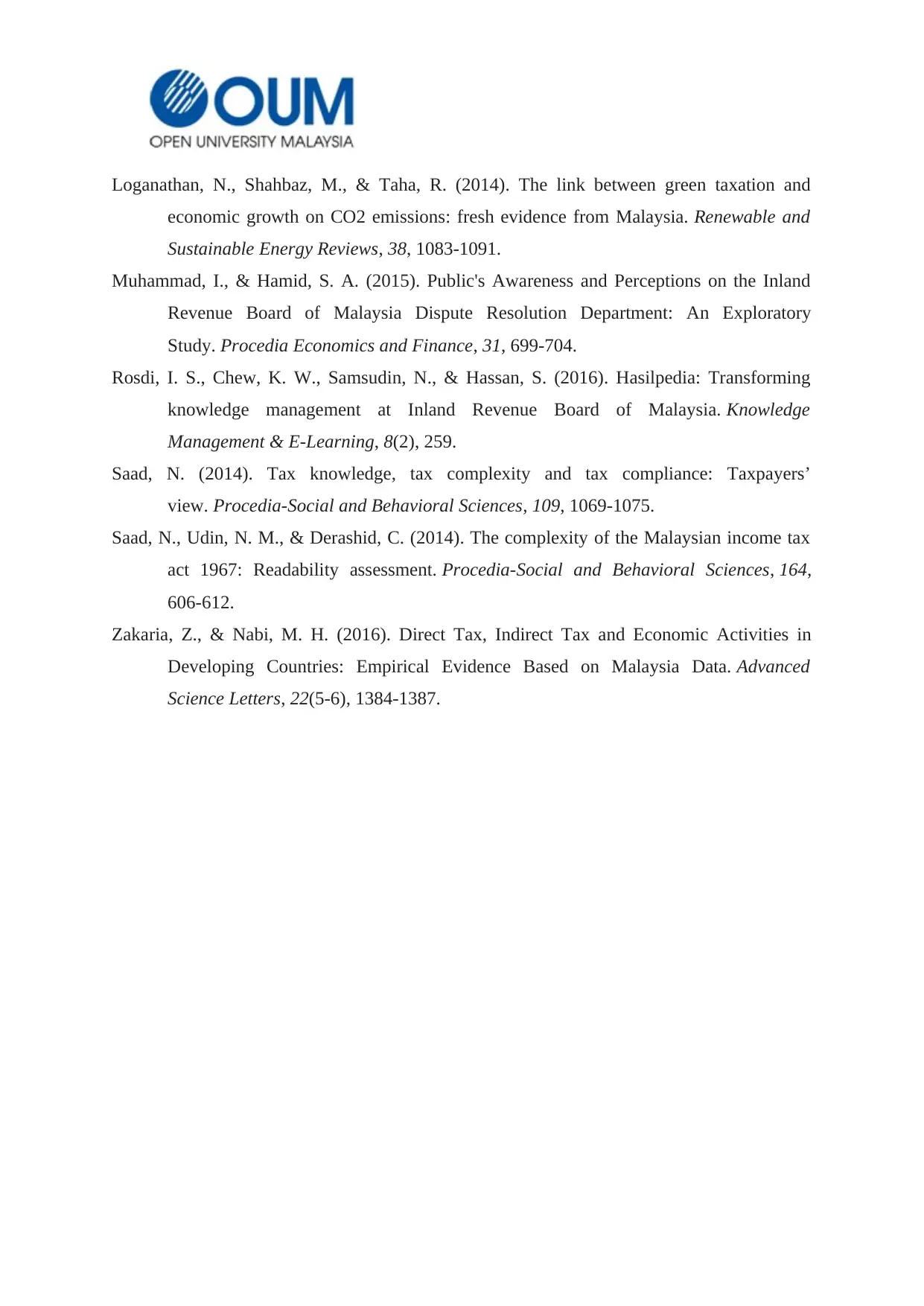
Loganathan, N., Shahbaz, M., & Taha, R. (2014). The link between green taxation and
economic growth on CO2 emissions: fresh evidence from Malaysia. Renewable and
Sustainable Energy Reviews, 38, 1083-1091.
Muhammad, I., & Hamid, S. A. (2015). Public's Awareness and Perceptions on the Inland
Revenue Board of Malaysia Dispute Resolution Department: An Exploratory
Study. Procedia Economics and Finance, 31, 699-704.
Rosdi, I. S., Chew, K. W., Samsudin, N., & Hassan, S. (2016). Hasilpedia: Transforming
knowledge management at Inland Revenue Board of Malaysia. Knowledge
Management & E-Learning, 8(2), 259.
Saad, N. (2014). Tax knowledge, tax complexity and tax compliance: Taxpayers’
view. Procedia-Social and Behavioral Sciences, 109, 1069-1075.
Saad, N., Udin, N. M., & Derashid, C. (2014). The complexity of the Malaysian income tax
act 1967: Readability assessment. Procedia-Social and Behavioral Sciences, 164,
606-612.
Zakaria, Z., & Nabi, M. H. (2016). Direct Tax, Indirect Tax and Economic Activities in
Developing Countries: Empirical Evidence Based on Malaysia Data. Advanced
Science Letters, 22(5-6), 1384-1387.
economic growth on CO2 emissions: fresh evidence from Malaysia. Renewable and
Sustainable Energy Reviews, 38, 1083-1091.
Muhammad, I., & Hamid, S. A. (2015). Public's Awareness and Perceptions on the Inland
Revenue Board of Malaysia Dispute Resolution Department: An Exploratory
Study. Procedia Economics and Finance, 31, 699-704.
Rosdi, I. S., Chew, K. W., Samsudin, N., & Hassan, S. (2016). Hasilpedia: Transforming
knowledge management at Inland Revenue Board of Malaysia. Knowledge
Management & E-Learning, 8(2), 259.
Saad, N. (2014). Tax knowledge, tax complexity and tax compliance: Taxpayers’
view. Procedia-Social and Behavioral Sciences, 109, 1069-1075.
Saad, N., Udin, N. M., & Derashid, C. (2014). The complexity of the Malaysian income tax
act 1967: Readability assessment. Procedia-Social and Behavioral Sciences, 164,
606-612.
Zakaria, Z., & Nabi, M. H. (2016). Direct Tax, Indirect Tax and Economic Activities in
Developing Countries: Empirical Evidence Based on Malaysia Data. Advanced
Science Letters, 22(5-6), 1384-1387.
1 out of 10
Related Documents
Your All-in-One AI-Powered Toolkit for Academic Success.
+13062052269
info@desklib.com
Available 24*7 on WhatsApp / Email
![[object Object]](/_next/static/media/star-bottom.7253800d.svg)
Unlock your academic potential
Copyright © 2020–2026 A2Z Services. All Rights Reserved. Developed and managed by ZUCOL.




